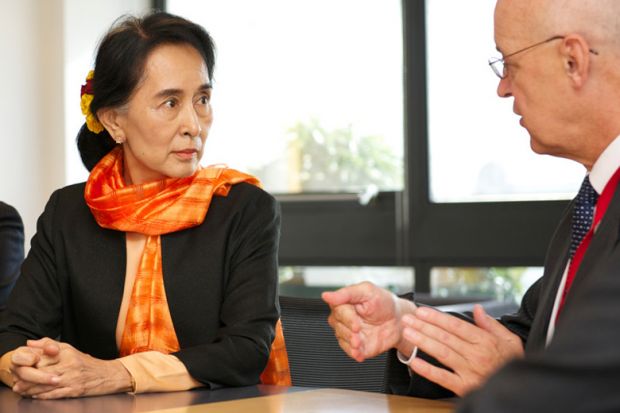A legal system without legal textbooks
Aung San Suu Kyi inspires University of Oxford to help Myanmar
University academics answer an appeal for help from country’s inspirational leader
Aung San Suu Kyi was given an honorary doctorate in civil law by the University of Oxford in 1993. Yet it was only in 2012, after many years of house arrest in Myanmar, that she was able to come and receive the award in person.
Her acceptance speech recalled “very precious memories” of her student days and said that she would “like to see university life restored to Burma in all its glory. And I would be so grateful if my old university, the University of Oxford, could help to bring this about once again.”
“Others had been keen to be involved before,” said Ed Nash, Oxford’s international strategy officer, “but the train really got moving then.” Today, he goes on, Myanmar is “the country where we have the largest ‘development’ role” and where Oxford was “doing more than any other university in the world”, through “a unique partnership which will deliver unique benefits”.
Given the spectacular victory of Ms Suu Kyi’s National League for Democracy in last November’s general election, there is obviously huge potential in such a partnership, but what has been achieved so far and where is it going now?
Initial collaborations focused on the University of Yangon, Myanmar’s premier institution of higher education (although long closed to undergraduates after the student protests of 1996), with a view to exerting influence outwards from there.
About 12 senior staff from the institution, including the second in command, the chief librarian and the heads of the departments of Burmese, chemistry, history, law and zoology, came to Oxford for a two-week visit in 2014 to discuss strategic planning, student support, curricula and research. The Oxford team is led by Nick Rawlins, pro-vice-chancellor (development and external affairs).
Many projects in the disciplines just mentioned have been developed. Oxford zoologists have joined forces with their Burmese counterparts in efforts to track the rare clouded leopard in the country’s forests. Like initiatives by the department of earth sciences to revive geology within Myanmar, this also functions as a way of building local skills.
There is now a programme in modern Burmese studies at St Antony’s College, headed since 2013 by Matthew Walton, the first Daw Aung San Suu Kyi senior research fellow. The following year, Khin Mar Mar Kyi was appointed Daw Aung San Suu Kyi gender research fellow in Burmese studies at Lady Margaret Hall’s International Gender Studies Centre.
Yet perhaps the most developed programme is taking place in the crucial discipline of law.
When Timothy Endicott, then dean of the law faculty, visited the University of Yangon in 2013, he found that the library there was lacking in the crucial British law reports. He therefore appealed to the Bodleian Libraries to see if they had duplicates. It turned out that they did have complete spare sets, recalls law librarian Ruth Bird, so they set about filling “about 300 boxes with 5,000 reports” and securing funding for the shipment. Another 3,600 books in areas such as forestry have been donated by the Radcliffe Science Library.
Andrew Burrows, professor of the law of England, has long been interested in Myanmar and therefore grabbed the opportunity to spend a week teaching tort and contract law at the universities of Yangon, East Yangon and Dagon.
A major issue was a tradition of rote learning, with students “reciting the laws of contract as if they were a hymn, without understanding or being able to apply them”. This led Professor Burrows to adopt a style of “interactive teaching”, with lots of questions and hypothetical examples, which after a slow start generated much enthusiasm.
Yet his experiences in Myanmar also made him realise how many of its legal provisions date back to the 1872 Contract Act drafted by the British. The system is theoretically based on precedent and court proceedings were indeed published in English up until 1965 – although these are available in Oxford but very hard to find in Myanmar itself. The result of all this, explains Professor Burrows, is that “no one quite knows what the law of contract in Myanmar is” and that the country is effectively operating “a legal system without legal textbooks”.
His colleague Adrian Briggs, professor of private international law (which focuses on conflicts between different legal systems), taught in Myanmar in 2014 and went back a year later. There were no textbooks available in his field either, which, as the country opens up, risks leaving the Burmese “seriously underarmed in dealing with foreign lawyers”. He therefore decided to produce his own, now freely available online as Private International Law in Myanmar.
https://www.timeshighereducation.com/news/aung-san-suu-kyi-inspires-university-oxford-help-myanmar



3 comments
Shar Thet Man
April 28, 2018 at 1:39 pm
ခုတော့အင်္ဂလိပ်စာဖတ်ဖို့ပျင်းနေပါသေးတယ် အားရင်ဖတ်လိုက်ပါမယ်
kai
December 14, 2019 at 1:48 am
ဖတ်ရန် ၁)
https://www.law.ox.ac.uk/news/2015-03-03-report-visit-professor-burrows-yangon-february-2015
kai
December 14, 2019 at 1:48 am
ဖတ်ရန် ၂)
https://www.law.ox.ac.uk/research-and-subject-groups/private-international-law-myanmar